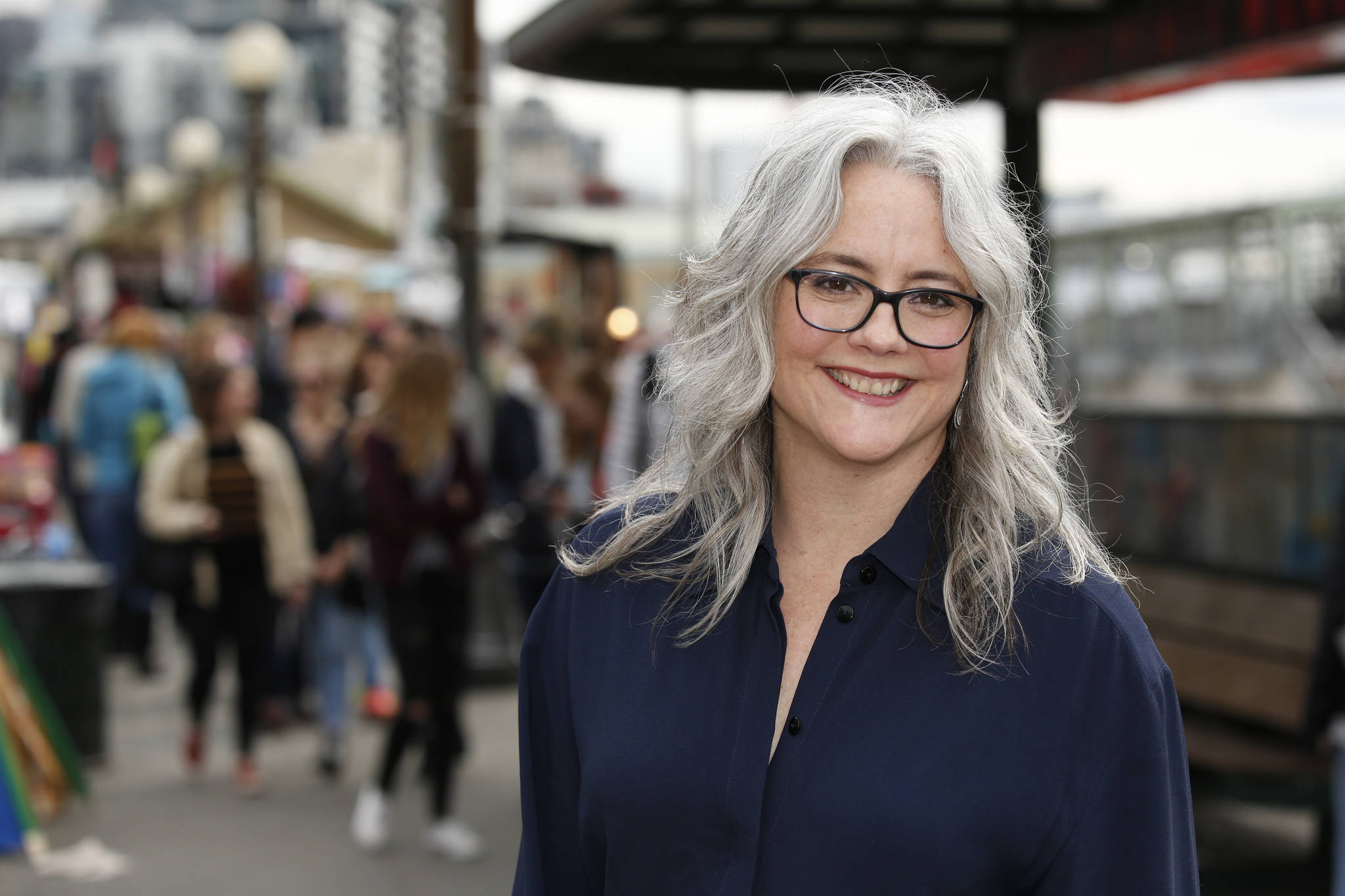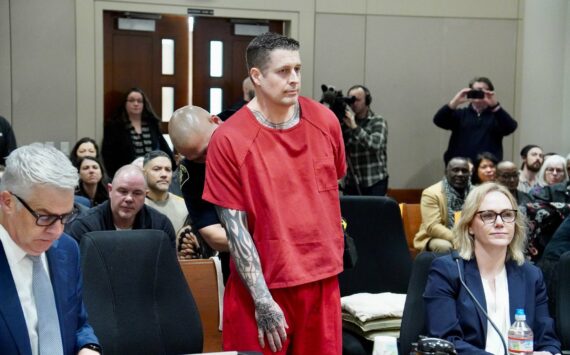This morning, Cary Moon announced her candidacy for Seattle mayor, joining a race already filled with candidates including incumbent Ed Murray, former mayor Mike McGinn and lawyer/activist Nikkita Oliver. The Pike Place Market resident has experience in urban planning and civic organizing; in particular, she was deeply involved in the effort to replace the Viaduct along the waterfront with a more pedestrian- and transit-friendly alternative to Bertha’s big car tunnel.
We sat down with Moon this morning to talk about her candidacy.
Seattle Weekly: You’re perhaps best known for advocating an alternative to the Bertha tunnel, which recently, finally completed digging. What’s your opinion now?
Cary Moon: Whether you like it or not, it’s here. The issue going forward is, how do we make sure Seattle taxpayers are not on the hook for all the hundreds of millions of dollars in contractor errors that haven’t been paid for yet?
SW: How do we ensure that?
CM: Continue to stand strong with the City Council and other civic leaders in Seattle, and keep reminding WSDOT that ‘this is your problem to sort out, not ours.’
SW: Do you still feel you were right about the waterfront and Bertha?
CM: Investment in local transit and local street improvements, so we can serve people trying to come in and out of downtown Seattle—that was a problem ten years ago, that we were trying to solve, and it’s still a problem now, perhaps even worse. So in terms of streets and transit solutions, what we were trying to propose then, I feel like we could have gotten ahead of some of this traffic congestion and lack of transit that we’re dealing with now. So yeah, we could have gotten ahead of this if we had pursued that approach.
And the waterfront, what got me started on that was largely, ‘How do we reclaim that 22 acres of civic space for the citizens of Seattle and create a place to have fun in public together and socialize together?’ To me that represents our values as a progressive city: when you take the most valuable real estate in the city and devote it to public use. So I’m really proud of being one of the initiators of that vision, and guiding that to implementation, which is happening now via the Waterfront Seattle Project.
SW: Where are you on rent control?
CM: I haven’t seen effective examples of it solving the problem without causing other, bigger problems, so I would approach that with caution. That said, though, we need to be a lot more aggressive in certain communities around stopping the price escalation, because displacement and gentrification are basically driving low-income and working people and especially communities of color out of Seattle. We’ve got to look at all the solutions on the table.
SW: In other words, you’re cautiously, skeptically open to considering it?
CM: Yeah. I mean, I hear this phrase, ‘rent stabilization.’ There are things you can do to make it harder to raise rents so quickly. To me that feels like a more constructive way to start the dialogue, because rent control comes with a huge package of problems. So, I’m open to considering ideas around how to make rent stabilization work.
SW: What about Trump Proof Seattle’s proposal of a city income tax (which would trigger a state Supreme Court challenge and could potentially legalize progressive income taxes across Washington)?
CM: I love the idea, I love the energy. I want to make sure we’re picking the most viable path to yes. I need to sit down with experts to understand, ‘Is that the most viable path, or should we be starting with a capital gains tax?’ But we need some solution to get the tax code right side up, get wealthy people paying their fair share. Low-income people and working families have contributed enough. They’ve been generous enough. No more sales tax and property tax increases. We need new approaches.
SW: So you’re saying yes in general, but the details of how to do it are still up in the air?
CM: Exactly. We need the right legal strategy to get the right answer.
SW: What about safe drug sites, also called CHELs? Public health wonks love them, while many neighbors hate the idea.
CM: Yes. I’m for them. Drug use is part of our city, and people deserve safe sites.
SW: What about homeless encampment evictions? Would you continue the mayor’s strategy, or revisit legislation proposed by Mike O’Brien and the state ACLU last year that would limit authorities’ ability to evict camps?
CM: I was in favor of that [legislation]. The work Mike O’Brien and service providers and people who’ve been working in the homelessness space for a long time, they came up with the right proposal with the ACLU. I feel like we have to invite people in, give them viable alternatives, but also treat them with dignity and respect as they’re finding their way back to safety.
SW: Are you in favor of a policy that requires authorities to provide an alternative campsite when they evict people?
CM: I’m not familiar enough with the details. I would say the two things I’m for in principle are humane and dignified treatment for people who are sleeping out, to encourage them to come into a safer, more secure place. And also having a more secure place to offer. So, that means low-barrier shelters. It means possibly more tiny house villages, which are temporary, but they are safe and they are more secure than being in a tent, and the self-governance aspect is a way of getting people reclaiming authority for a positive trajectory in their lives… Also, we need to look with shelter providers at why isn’t there space in the shelters? Or if there is space, why isn’t doesn’t it fit people’s needs and what can we do about that?… [We need to be] offering viable spaces for people and treat them humanely.
SW: If elected, you would revisit encampment eviction policy?
CM: Yes. I would reconsider that strategy, go back to the ACLU and Mike O’Brien’s proposal, and see if we can’t come to a solution that’s more closely aligned with that.
SW: You say you’ll balance the need for more density with preserving neighborhood character. How?
CM: We [should] all agree on some basic principles—that we’re growing, people are moving here, everyone should feel welcome, join us, this is a great place to live, we’re happy you’re here—and recognize that we have to build more housing for these people. But there’s a way to do that while preserving neighborhood character, and a lot of the discussion has been around, ‘How do you provide for the missing middle?’ Which includes looking again at what can we do to do infill-development in urban villages, and looking again at single-family zoning and considering triplexes, duplexes, congregate housing, accessory dwelling units—reconsidering that approach under a new, shared, collective commitment to, ‘We’re growing and we need to grow in a way that preserves character and protects vulnerable communities.’ And I think if we get the context right and we get the principles set and people understand what we are as a city, what we’re trying to do in the future, I think we can re-open that discussion.
SW: What would you change or keep in the current HALA approach to development and growth?
CM: I think the Mandatory Housing Affordability stuff is good. Let’s do it, let’s get it done. We probably could have done more downtown. I think we left a lot on the table in that negotiation. I’m sorry about that. But that said, there’s a lot of other stuff in HALA and a lot of solutions that didn’t make it into HALA that I’d like us to consider. We talked about looking at Airbnb and really understanding how much people are profiteering off taking off the market for long-term rentals and putting it in short-term rentals. We need to understand that. We need to relook again at all the missing, middle pieces. We need to look at new revenue sources, like I talked about earlier around housing affordability, [and] if those revenue sources can be brought back into building more affordable housing.
And we need to look at city surplus land. It’s like, ‘Wait a minute, there’s all these acres of land that the city owns that we’re not using.’ Yes, some of it’s entangled, but some of it could be made available for non-profit and public housing.
SW: If for whatever reason you can’t run, who will you vote for?
CM: I want to say something slightly different. I want to encourage everyone to really look at Nikkita Oliver, who is brilliant. She’s got a great legal mind, she understands what we need to do for racial equity, she’s got a vision for Seattle that I believe a lot of us would agree with or share. And she’s bringing a lot to the table, and I would really like the chance to have more public dialogue with her as two strong woman voices aiming at similar goals, [about] how do we spark creative dialogue and courage in order to do some of the things we need to do?
SW: What’s your position on the Children and Family Justice Center, aka the new youth jail?
CM: On the youth jail, I believe we made a giant mistake in approving that project, and we need to go back and re-scope that project and put a new proposal to the public for a much smaller project that emphasizes restorative justice and building alternatives to incarceration for youth built into it. The significant amount of the funding needs to go toward those solutions, not an oversized building that’s just exacerbating and continuing the problem. So I would like to go back to the drawing board, whatever it takes to do that, go back to the voters with a new proposal for the youth jail.
SW: But the new facility would still have youth detention capacity, correct?
CM: I think there are certain cases when you need space—like people having psychotic breakdowns. We can’t pretend that never happens, but we have to do it in the most human and last-straw way. Incarcerating youth should be the absolute last straw, when everything else has been tried.
SW: What’s your biggest hope for this election, other than winning?
CM: I want to see a new commitment to a Seattle that shares wealth and prosperity with everyone, that has a true commitment to economic security and housing security for all of us, and a constructive debate around, ‘How do we achieve the solutions that help everybody feel secure and welcome and like they belong here?’ Having a constructive debate around solutions is really what I hope for.
cjaywork@seattleweekly.com
This transcript has been lightly edited for clarity.








